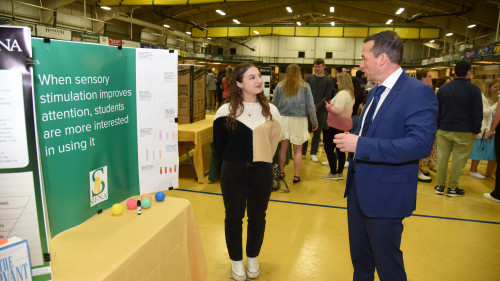

By Lauren Mathews ’15
Lauren Mathews ’15 is a senior computer science major at Siena College with a minor in philosophy. She partnered with Siena professors Meg Fryling ’97, Ph.D., and Jami Cotler, fellow student Shauna Pratico ’14 and SUNY Cobleskill professor Jack Rivituso on a research project about cyberbullying. Their paper titled “Cyberbullying or normal game play? Impact of age, gender, and experience on cyberbullying in multi-player online gaming environments: Perceptions from one gaming forum” won Best Paper at the 2014 Conference on Information Systems Applied Research.
My interest in cyberbullying is personal because I’m a victim. During my freshman year of high school, a group of my classmates created a Facebook page about me. They posted pictures and videos of me in school and added hurtful comments. The most upsetting part was that many of my classmates knew about the page, yet none of them stood up and reported it to an authority figure or mentioned it to me. I was able to get the page taken down and used that negative experience as motivation for research. I became interested in understanding why people would choose to attack someone online and why no one decided to speak up. I also wanted to learn more about and the consequences of cyberbullying – both to myself and to the general population.
After a year’s worth of research on information retrieval with Sharon Small, Ph.D., I accepted Meg Fryling, Ph.D.’s, offer to work with her and professor Jami Cotler on the very subject that has sparked my interest for the past several years. Our research was devoted to discovering the consequences of cyberbullying within video games, both in the virtual and real worlds.
Many people aren’t aware of the effects that video games have on us. If people are playing video games for hours, and they’re putting in substantial effort, it’s going to have an effect when they are attacked by other gamers, and we sought to understand that impact.
Our research involved three components: a full literature review, a survey of more than 1,000 people and observations of gamers in action. Nice, quiet people in real life may sometimes turn into very different people online, which can cause a psychological conflict within.
Their actions also affect others.
An initial analysis of the survey can be found within the paper, but one of the most interesting behaviors that I noticed was during trolling: some players will use the feminine form when swearing or attacking another player, regardless of the player’s actual gender. Afterwards, the gamers remarked that it was becoming a gender-neutral term within video games, even though it becomes a barrier between male and female gamers.
Although many wanted to support reporting this kind of behavior, no reports were actually sent in. One gamer insisted that this was because they would be seen as a bad gamer, even as over-sensitive, making them reluctant to say anything at all.
This research project was a valuable academic experience and it helped me understand a topic that had troubled me since I was in my early teens. Participating in this unique, collaborative project with my Siena professors helped me become a better communicator and team player. Most importantly though, it helped me understand the issues related to cyberbullying and, in some way, help to address them, in hopes of preventing others from experiencing the pain of online torment from their peers.

